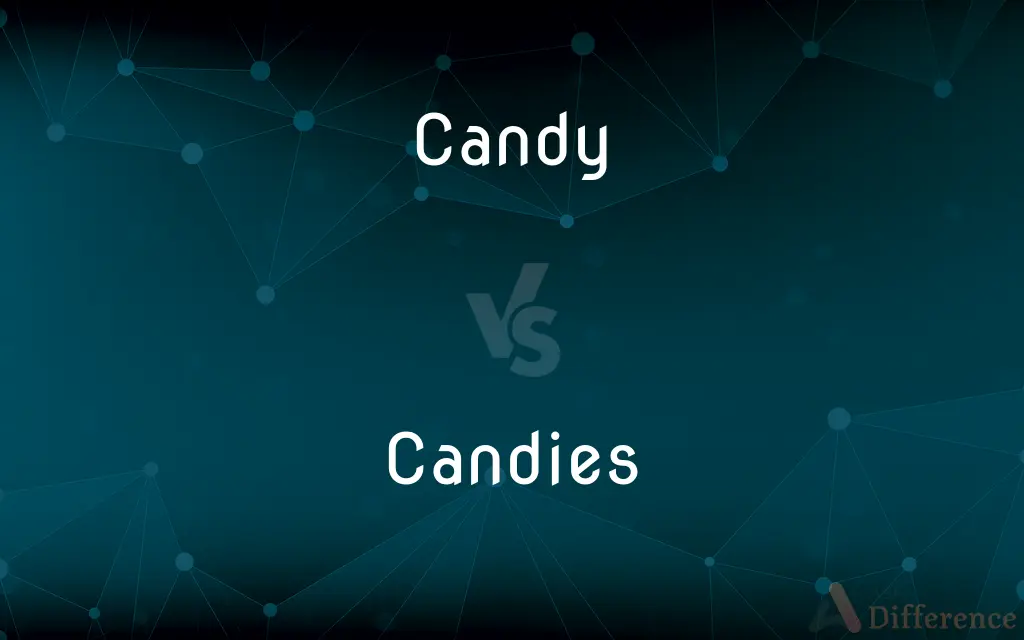Candy vs. Candies — What's the Difference?
By Fiza Rafique & Maham Liaqat — Updated on April 3, 2024
Candy refers to a single type or piece of confectionery, typically sweet and enjoyed as a treat, while candies are the plural form, indicating a collection or variety of such sweet confections.

Difference Between Candy and Candies
Table of Contents
ADVERTISEMENT
Key Differences
Candy, in the singular form, often denotes either a single piece of sweet confectionery or the general concept of confectionery as an uncountable noun. For example, one might say, "I want a piece of candy," indicating a single item, or "Candy is bad for your teeth," referring to the category of sweets in general. On the other hand, "candies" is used when referring to multiple types or pieces of candy, highlighting the diversity or quantity, as in "She bought several candies from the store."
When discussing the confectionery industry or culinary arts, "candy" can refer to the broader category encompassing various sweets, including chocolates, gummies, and hard candies, among others. Conversely, "candies" emphasizes the range within this category, suggesting an assortment that might include different flavors, shapes, and types of confectionery items.
In a cultural or celebratory context, "candy" symbolizes the broader tradition of sweet treats associated with holidays, parties, or special occasions. For instance, candy given during Halloween or Valentine's Day. Whereas "candies" might be used to describe the specific selections given or received, such as in a candy bowl or a gift box, illustrating the variety and abundance of choices available.
Nutritionally speaking, discussions about "candy" often address the health implications of consuming sugary snacks, focusing on the singular notion of candy as a dietary component. Discussions about "candies," however, might delve into the differences among various types, comparing their sugar content, ingredients, and potential health effects, thereby distinguishing between the health impacts of different candy varieties.
Comparison Chart
Definition
A single type or piece of confectionery.
Plural form, indicating a variety or collection of confections.
ADVERTISEMENT
Usage
Refers to either a single item or the general concept.
Used when specifically talking about multiple items or types.
Context
Can denote a broader category or a single piece.
Emphasizes diversity or quantity within the category.
Cultural Significance
Often symbolizes the tradition of sweet treats in general.
Highlights the variety and choice within those traditions.
Nutritional Discussion
Focuses on the general health implications of consuming sweets.
May compare the health impacts of consuming different types.
Compare with Definitions
Candy
Confectionery Category.
Candy making is an art that involves a deep understanding of flavors and textures.
Candies
Variety of Confections.
The store offers a wide selection of candies, from chocolate bars to sour gummies.
Candy
Single Piece.
He picked out a piece of candy from the bowl.
Candies
Multiple Pieces.
She filled her pockets with candies before the movie.
Candy
Nutritional Aspect.
Consuming too much candy can lead to dental problems.
Candies
Comparison of Nutritional Content.
Among the candies, dark chocolate is often considered a healthier option.
Candy
General Concept.
Candy is a popular treat among children and adults alike.
Candies
Assortment in Gifts.
The gift box was filled with assorted candies, pleasing everyone’s taste.
Candy
Candy, also called sweets (British English) or lollies (Australian English, New Zealand English), is a confection that features sugar as a principal ingredient. The category, called sugar confectionery, encompasses any sweet confection, including chocolate, chewing gum, and sugar candy.
Candies
Diverse Flavors and Types.
Exploring different candies from around the world can be a delicious adventure.
Candy
A rich sweet confection made with sugar and often flavored or combined with fruits or nuts.
Candies
A rich sweet confection made with sugar and often flavored or combined with fruits or nuts.
Candy
A piece of such a confection.
Candies
A piece of such a confection.
Candy
(Slang) An illicit drug, especially one, such as cocaine, that has a sugary appearance or a drug in pill form, such as MDMA.
Candies
(Slang) An illicit drug, especially one, such as cocaine, that has a sugary appearance or a drug in pill form, such as MDMA.
Candy
To cook, preserve, saturate, or coat with sugar or syrup
Candy apples.
Candy ginger.
Candies
To cook, preserve, saturate, or coat with sugar or syrup
Candy apples.
Candy ginger.
Candy
Edible, sweet-tasting confectionery containing sugar, or sometimes artificial sweeteners, and often flavored with fruit, chocolate, nuts, herbs and spices, or artificial flavors.
Candies
Plural of candie
Candy
A piece of confectionery of this kind.
Candies
Plural of candy
Candy
Crack cocaine.
Candy
(uncountable) An accessory (bracelet, etc.) made from pony beads, associated with the rave scene.
Candy kid; candy raver
Candy
(obsolete) A unit of mass used in southern India, equal to twenty maunds, roughly equal to 500 pounds avoirdupois but varying locally.
Candy
(cooking) To cook in, or coat with, sugar syrup.
Candy
(intransitive) To have sugar crystals form in or on.
Fruits preserved in sugar candy after a time.
Candy
(intransitive) To be formed into candy; to solidify in a candylike form or mass.
Candy
To conserve or boil in sugar; as, to candy fruits; to candy ginger.
Candy
To make sugar crystals of or in; to form into a mass resembling candy; as, to candy sirup.
Candy
To incrust with sugar or with candy, or with that which resembles sugar or candy.
Those frosts that winter bringsWhich candy every green.
Candy
To have sugar crystals form in or on; as, fruits preserved in sugar candy after a time.
Candy
To be formed into candy; to solidify in a candylike form or mass.
Candy
Any sweet, more or less solid article of confectionery, especially those prepared in small bite-sized pieces or small bars, having a wide variety of shapes, consistencies, and flavors, and manufactured in a variety of ways. It is often flavored or colored, or covered with chocolate, and sometimes contains fruit, nuts, etc.; it is often made by boiling sugar or molasses to the desired consistency, and than crystallizing, molding, or working in the required shape. Other types may consist primarily of chocolate or a sweetened gelatin. The term may be applied to a single piece of such confection or to the substance of which it is composed.
Candy
Cocaine.
Candy
A weight, at Madras 500 pounds, at Bombay 560 pounds.
Candy
A rich sweet made of flavored sugar and often combined with fruit or nuts
Candy
Coat with something sweet, such as a hard sugar glaze
Common Curiosities
How do you decide whether to use "candy" or "candies" in a sentence?
Use "candy" when talking about the category as a whole or a single piece/item, and "candies" when referring to multiple pieces or types of candy.
How has the production of candy evolved over time?
The production of candy has evolved from simple, handmade sweets to complex, mass-produced confections with a wide variety of ingredients, flavors, and packaging designed to extend shelf life and enhance appeal.
Can "candies" refer to a single type of candy in multiple quantities?
Yes, "candies" can refer to multiple quantities of a single type, emphasizing the number of pieces rather than the variety.
Can "candy" be used as a plural noun?
"Candy" can be used as an uncountable noun to refer to confectionery in general but not as a plural noun. "Candies" is the correct plural form when referring to multiple types or pieces.
Is "candy" used differently in American and British English?
Yes, in American English, "candy" refers to all types of sweet confections, while in British English, "sweets" is more commonly used, and "candy" might specifically refer to crystallized sugar confections.
Are all sweets considered candy?
While "candy" broadly encompasses a wide range of sweet confections, cultural and regional preferences might distinguish certain sweets from what is typically classified as "candy."
What role does candy play in global cultures?
Candy plays a significant role in global cultures, often associated with celebrations, holidays, and as a universal symbol of joy and treat.
What are some health considerations when consuming candies?
Health considerations include managing sugar intake, potential allergies to specific ingredients, and the impact on dental health.
What are some health considerations when consuming candy?
Candy is the singular form, managing sugar intake, potential allergies to specific ingredients, and the impact on dental health .
Can candy used in cultural events?
Candy canes are a staple candy during the Christmas season.
Share Your Discovery

Previous Comparison
Equivalent vs. Equivalently
Next Comparison
Pied vs. PiperAuthor Spotlight
Written by
Fiza RafiqueFiza Rafique is a skilled content writer at AskDifference.com, where she meticulously refines and enhances written pieces. Drawing from her vast editorial expertise, Fiza ensures clarity, accuracy, and precision in every article. Passionate about language, she continually seeks to elevate the quality of content for readers worldwide.
Co-written by
Maham Liaqat













































